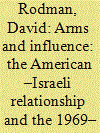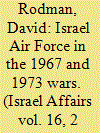| Srl | Item |
| 1 |
ID:
164321


|
|
|
|
|
| Summary/Abstract |
The dominant view of the American‒Israeli relationship holds that it has been driven primarily by shared interests and values; however, since the 1960s, the relationship has been governed first and foremost by a ‘security-for-autonomy’ bargain. Under the terms of this bargain, Washington has obtained a significant amount of influence over Israeli foreign policy in exchange for American arms transfers to Israel. The 1969‒1970 War of Attrition clearly illustrates how this bargain has operated in practice. The United States manipulated Israeli military conduct in a manner that accommodated American national interests by withholding or supplying arms at key junctures of the war.
|
|
|
|
|
|
|
|
|
|
|
|
|
|
|
|
| 2 |
ID:
093971


|
|
|
|
|
| Publication |
2010.
|
| Summary/Abstract |
The Israel Air Force (IAF), according to conventional wisdom, constituted the decisive element in Israel's victory in the 1967 Six Day War, but had much less of an impact on the state's triumph in the 1973 Yom Kippur War. The present article takes issue with this line of thinking, contending that, while the IAF's contributions to the Israeli victories in both wars were quite significant, airpower actually was more important in the latter triumph, but not decisive in either one. The article reaches this conclusion through an in-depth comparison of the IAF's accomplishments (or lack thereof) in both wars.
|
|
|
|
|
|
|
|
|
|
|
|
|
|
|
|
| 3 |
ID:
122548


|
|
|
|
|
| Publication |
2012.
|
| Summary/Abstract |
From 12 July until 15 August 2006, the Israel Defense Forces (IDF) waged a
thirty-four-day war against the Iranian terrorist proxy organization Hezbollah
in response to a well-planned raid by a team of Hezbollah combatants from
southern Lebanon into northern Israel. That raid resulted in the abduction of
two IDF soldiers, who had then been taken back into Lebanon for use as hostages.1
Code-named Operation CHANGE OF DIRECTION, the greatly escalated
counteroffensive that the raid prompted has since been widely regarded as the
IDF's most inconclusive combat performance in Israel's history. Waged under
the direction of Prime Minister Ehud Olmert and his minister of defense at the
time, Amir Peretz, the campaign was dominated by precision standoff attacks
by the Israel Air Force (IAF) and by IDF artillery and battlefield rockets, with
no significant commitment of conventional ground troops until the last days of
fighting before a cease-fire went into effect.
|
|
|
|
|
|
|
|
|
|
|
|
|
|
|
|